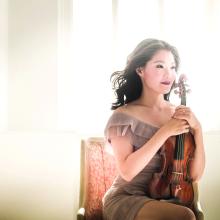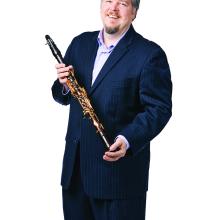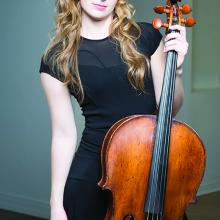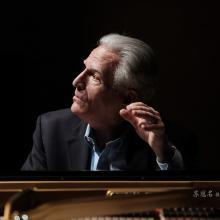Faculty colleagues Rachel Lee Priday, violin; Benjamin Lulich, clarinet; Sarah Rommel, cello; and Craig Sheppard, piano, perform one of Olivier Messiaen’s signature works, The Quartet for the End of Time, composed in 1940-41 during Messiaen's detention in a prisoner-of-war camp in Poland.
Program
I saw a powerful angel descending from the heavens, enveloped in a cloud with a rainbow on its head. Its face radiated the sun, its feet like columns of fire, its right foot placed on the sea, the left foot on the earth. Standing erect on both sea and earth, it raised its hands towards the heavens and swore by the everlasting power: There will be no more time. When the trumpet of the seventh angel sounds, God’s mystery will reveal itself.
—Revelations, Chapter 10
I. Liturgy of the Cristal
II. Voice of the Angel, announcing the End of Time
III. The Abyss of the Birds
IV. Intermezzo – a Scherzo
V. Praise to the Eternity of Jesus
VI. Dance of fury of the seven trumpets
VII. Plethora of rainbows, the Angel announcing the End of Time
VIII. Praise to the Immortality of Jesus
Program Notes
Messiaen’s The Quartet for the End of Time
Olivier Messiaen (1908-1992) was one of the most prominent composers of the twentieth century, as well as an accomplished pianist and organist. His all encompassing works were a result of his intense religious beliefs, his great love of nature (particularly birdsong), and his intense curiosity about the world in which he lived. His compositions extended the boundaries of time and space, and in particular color, the concept he always referred to as the most important in all music. Messiaen had synesthesia, the ability to perceive color in myriad ways in all forms of music – indeed, he even classified composers according to color!
The Quartet for the End of Time, based on Chapter X of the Book of Revelations (also known as The Apocalypse of Saint John), was composed primarily during the year that Messiaen was incarcerated as a political prisoner by the Germans, May 1940-41, in Görlitz (southwestern Poland). Other musicians whom he knew in the camp included a violinist, a cellist, and a clarinetist. The clarinetist, Henri Akoka, had been captured in Verdun at the same time as Messian, and Messiaen had already composed sketches for the third movement, The Abyss of the Birds, before arriving in the camp. Likewise, two movements (Praise to the Eternity of Jesus and Praise to the Immortality of Jesus) had their genesis in previous works. Given manuscript paper and pencils by a friendly German guard, Messiaen was able to complete the eight movements, and the first performance took place in frigid conditions on January 15, 1941 in the presence of 500 prisoners and their guards.
I. The Liturgy of the Cristal evokes the earth at sunrise, bird song in varying forms in the trees, the stillness of the land slightly disturbed by syncopated rhythms.
II. The seven trumpets announce The Voice of the Angel, a rainbow garnering its head, five enormous chords descending on the piano as the angel places its feet on the earth and the sea. The middle section represents the timelessness of Heaven. At the end, the angel returns to the heavens in five ascending chords, a mirror of the chords at the beginning of the movement.
III. The Abyss of the Birds is the central movement, a sad plain chant, a commentary of the state of the world, yearning for something better. It is extremely difficult for even the greatest of clarinetists!
IV. The Intermezzo is a light hearted Scherzo, the three instruments (minus the piano) dancing to previously alluded to melodies. The clarinet often strikes out on its own.
V. The infinite love of Jesus on the earthly plane is portrayed here in an extremely slow suspension of time, played passionately by the cello and accompanied by steady chords in the piano.
VI. From Messiaen, we learn that this Dance of Fury, played in unison by all four instruments, represents a combination of all seven trumpets announcing the Apocalypse, music of stone and steel and ‘cold drunkenness’. The theme is played in augmentation, fortissimo, at the conclusion.
VII. The angel reappears, swathed in a cloud (foullis in French) of rainbows. We hear the same harmonies as in the second movement, but much faster, angrier and more urgent. A moment of ecstasy appears towards the end with the violin and cello playing fortissimo over the slow arpeggiation of the piano. Suddenly, it all comes to a crashing halt!
VIII. Analogous to the fifth movement cello solo, the violin portrays Jesus ascending to the heavens, accompanied by the slow heartbeat of the chords in the piano. Moments of heightened ecstasy are followed by an ascent into eternity.
This performance holds special meaning for me, as this is the first time I am playing it after 52 years! In 1970, I gave the very first performance at the Marlboro Festival of The Quartet for the End of Time. We also took the Quartet on a Marlboro Tour in March of 1971 (‘we’ included the violinist, Isadore Cohen, the cellist Nathaniel Rosen, and the clarinetist Richard Stoltzman). Subsequently, the Quartet for the End of Time became the center piece for Peter Serkin’s group, Tashi. I am delighted to be performing it again this evening with such wonderful colleagues here at the School of Music. —Copyright Craig Sheppard, 2023
Biographies
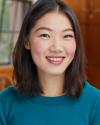
Violinist RACHEL LEE PRIDAY (PRY-day) is a passionate and inquisitive explorer in all her musical ventures, in search of contemporary relevance when performing the standard violin repertoire, and in discovering and commissioning new works. Her wide-ranging repertoire and eclectic programming reflect a deep fascination with literary and cultural narratives.
Rachel Lee Priday has appeared as soloist with major international orchestras, including the Chicago, Saint Louis, Houston, Seattle, and National Symphony Orchestras, the Boston Pops, and the Berlin Staatskapelle. Recital appearances have brought her to eminent venues including the Mostly Mozart Festival at Lincoln Center, Musée du Louvre, Verbier Festival, Ravinia Festival and Dame Myra Hess Memorial Series in Chicago, Mecklenburg-Vorpommern Festival in Germany, and tours of South Africa and the United Kingdom.
Committed to new music, and making enriching community and global connections, Rachel takes a multidisciplinary approach to performing that lends itself to new commissions organically merging poetry, dance, drama, stimulating visuals and music. Recent seasons have seen a new Violin Sonata commissioned from Pulitzer Prize Finalist Christopher Cerrone and the premiere of Matthew Aucoin’s “The Orphic Moment” in an innovative staging that mixed poetry, drama, visuals, and music. Rachel has collaborated several times with Ballet San Jose, and was lead performer in “Tchaikovsky: None But The Lonely Heart” during a week-long theatrical concert with Ensemble for the Romantic Century at the Brooklyn Academy of Music (BAM). Her work as soloist with the Asia America New Music Institute promoted new music relationships and cultural exchange between Asia and the Americas, combining new music premieres and educational outreach in the US, China, Korea and Vietnam.
Rachel began her violin studies at the age of four in Chicago. Shortly thereafter, she moved to New York to study with iconic pedagogue Dorothy DeLay, and continued her studies at the Juilliard School Pre-College Division with Itzhak Perlman. Rachel holds a B.A. degree in English from Harvard University and an M.M. from the New England Conservatory, where she studied with Miriam Fried. Since Fall 2019, she serves as Assistant Professor of Violin at the University of Washington School of Music.
Recent and upcoming concerto engagements include the Pacific Symphony, Buffalo Philharmonic, Johannesburg Philharmonic, Kwazulu-Natal Philharmonic, Stamford Symphony, and Bangor Symphony. Since making her orchestral debut at the Aspen Music Festival in 1997, she has performed with numerous orchestras across the country, such as the symphony orchestras of Colorado, Alabama, Knoxville, Rockford, and New York Youth Symphony. In Europe and in Asia, she has appeared at the Moritzburg Festival in Germany and with orchestras in Graz, Austria, Hong Kong, Singapore, and Korea, where she performed with the KBS Symphony, Seoul Philharmonic and Russian State Symphony Orchestra on tour.
Rachel has been profiled in The New Yorker, The Los Angeles Times, Family Circle, and The Strad. Her concerts have been broadcast on major media outlets in the U.S., Germany, Korea, South Africa, and Brazil, including a televised concert in Rio de Janeiro, numerous radio appearances on 98.7 WFMT Chicago radio, and American Public Media’s Performance Today. She been featured on the Disney Channel, “Fiddling for the Future” and “American Masters” on PBS, and the Grammy Awards.
Praised by the Chicago Tribune for her “irresistible panache,” Rachel Lee Priday enthralls audiences with her riveting stage presence and “rich, mellifluous sound.” The Baltimore Sun wrote, “It’s not just her technique, although clearly there’s nothing she can’t do on the fingerboard or with her bow. What’s most impressive is that she is an artist who can make the music sing… And though her tone is voluptuous and sexy where it counts, she concluded the ‘Intermezzo’ with such charm that her listeners responded with a collective chuckle of approval as she finished.”
She performs on a Nicolo Gagliano violin (Naples, 1760), double-purfled with fleurs-de-lis, named Alejandro.
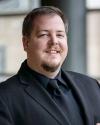
Benjamin Lulich, clarinet, joined the faculty of UW School of Music in Fall of 2016, as an artist-in-residence in the instrumental performance program.
Benjamin Lulich is the Principal Clarinet of the Seattle Symphony and Seattle Opera. He has held positions in Orange County’s Pacific Symphony, Kansas City Symphony, Colorado Music Festival and Festival Mozaic, and has performed frequently with The Cleveland Orchestra, Los Angeles Philharmonic, Los Angeles Opera, Pasadena Symphony, IRIS Orchestra and many other ensembles.
Additionally, Lulich is Principal Clarinet of the Sunriver Music Festival and has performed with the Hollywood Studio Orchestra on numerous films and records albums, including Water for Elephants, The Tourist, Monsters University, Godzilla, and the Oscar-winning score for Life of Pi. In 2013 he performed as Principal Clarinet for Yamaha’s 125th Anniversary Concert, which featured Elton John and many other performers; the concert was broadcast live to the world over the internet.
Also interested in chamber music and new music, Lulich has been a guest artist for concerts throughout the United States and abroad. Lulich was a member of the Second Instrumental Unit, a contemporary music ensemble based in New York City, where he took part in a concert honoring Milton Babbitt at Carnegie Hall’s Weill Recital Hall. As a recitalist and soloist, he has performed at the International ClarinetFest and was featured as a soloist with Pacific Symphony and Sunriver Music Festival on several occasions. On New Year’s Eve 2013 he performed with Jeff Tyzik and Ko-ichiro Yamamoto and the Seattle Symphony in the Jelly Roll Morton Suite.
The recipient of many awards and prizes, Lulich studied at Interlochen Arts Academy, Cleveland Institute of Music, Yale School of Music, Pacific Music Festival and Music Academy of the West, and his teachers include Richard Hawkins, Franklin Cohen, David Shifrin, Fred Ormand and Laura DeLuca.
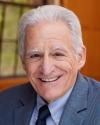
Craig Sheppard is Professor of Piano at the School of Music of the University of Washington in Seattle. He is also Professor of the Advanced Innovation Center at the China Conservatory in Beijing, and his former students hold positions in conservatories and universities throughout the world.
A veteran of over fifty years on the international stage, in the past few seasons he has performed both Shostakovich’s 24 Preludes and Fugues and Bach’s The Art of Fugue in venues throughout the United States, as well as London, Manchester (UK), Jerusalem, Shanghai and Beijing’s Forbidden City Concert Hall, in addition to giving masterclasses at all of the above.
As recording artist, his LPs and CDs have appeared on the Sony, Chandos, Philips, EMI and AT-Berlin labels. He has published 26 CDs with Romeo Records (NY) since 2005, including the complete Beethoven sonatas (Beethoven: A Journey), the Six Bach Partitas, the Inventions and Sinfornias, both books of The Well Tempered Clavier, the last three Schubert sonatas, Liszt’s Années de Pèlerinage I and II, Debussy’s 24 Preludes and 12 Études (including both books of Images and Estampes), the 24 Preludes and Fugues of Shostakovich, Late Piano Works, Opus 116-19, of Johannes Brahms, and Bach’s Die Kunst der Fuge (The Art of Fugue).
Within the past two decades, he has traveled many times to the Far East for performances and masterclasses, including Japan, Korea, China, Hong Kong, and Singapore. He has performed at the Nehru Memorial Library in New Delhi, held a residency at the Melba Conservatory in Melbourne, Australia, and performed three times in New Zealand, including the first ever public performances of both books of Bach’s Well Tempered Clavier. Most recently, he performed the Complete Chopin Nocturnes at the Museu do Oriente in Lisbon.
Born in Philadelphia in November, 1947, Craig Sheppard graduated from both the Curtis Institute and the Juilliard School, studying with Eleanor Sokoloff and Sasha Gorodnitzki respectively. He also worked with Rudolf Serkin and Pablo Casals at the Marlboro Festival, and later with Ilona Kabos, Peter Feuchtwanger and Sir Clifford Curzon in London. During his early years, in addition to a successful début at New York’s Metropolitan Museum of Art, he won top prizes in the Busoni, Ciani, and Rubinstein competitions. However, it was his Silver Medal at the Leeds International Piano Competition in 1972 that brought him to international attention. Moving to London in 1973 and living there for the next twenty years, Sheppard taught at Lancaster University, the Yehudi Menuhin School, and the Guildhall School of Music and Drama. He also performed on multiple occasions with all the major British orchestras and with many on the European continent, under such conductors as Sir George Solti, Erich Leinsdorf, Kurt Sanderling, James Levine, Michael Tilson Thomas, Aaron Copland, Lord Yehudi Menuhin, Sir Charles Mackerras, Sir Andrew Davis, Sir John Pritchard, Esa-Pekka Salonen, David Zinman, and Leonard Slatkin. In the United States, he has performed with the orchestras of Philadelphia, Boston, Chicago, Atlanta, Dallas, San Francisco, Rochester and Seattle, and many others.
Craig Sheppard’s solo repertoire is eclectic, comprising nearly fifty solo recital programs and more than sixty concerti covering a wide spectrum within the Western canon. He also has a great love of chamber music and has collaborated with many great instrumentalists and singers, including Wynton Marsalis, José Carreras, Victoria de los Angeles, Irina Arkhipova, Ida Handel, Sylvia Rosenberg, Mayumi Fujikawa, the Cleveland, Emerson and Miró string quartets, and many musicians of the younger generation, including James Ehnes, Stefan Jackiw, Richard O’Neill, Edward Arron and Johannes Moser.
Sheppard is invited frequently to serve on the juries of distinguished international competitions, including most recently the Arthur Rubinstein International Piano Master Competition in Tel Aviv in May of 2021 and the National Society of Arts and Letters in Chicago in 2022. He also returns regularly to the Jerusalem Music Center to perform and teach, as well as the Chetham’s Summer School in Manchester, UK. With colleague Dr. Robin McCabe, Sheppard is Co-Founder and Artistic Director of the Seattle Piano Institute, a boot camp for aspiring young pianists held every July at the University of Washington, this summer celebrating its 14th anniversary.
